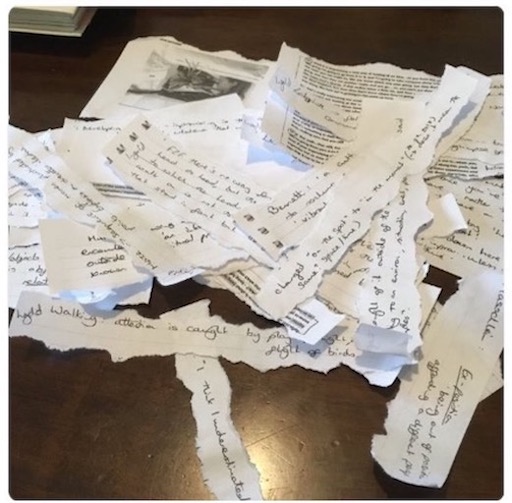3.1 Playing
Can you recall a moment when you have found yourself doodling during a meeting or indulging in a little daydreaming while driving? These are examples of moments when we are ‘playing’ in the sense that we are creating and capturing unformed thoughts. In order to imagine and dream differently, we need to be open to being playful with ideas. The French word for play has a broader definition than in the English language. In French, the word play means to play an instrument and to play as children, but it also means where something ‘has a little play’ in it, where it offers up an opportunity for a bit of movement. The role of playing in inquiry, of seeing what materials, processes, ideas ‘have a little play’ in them, allows us to find where we might move our dreaming or imagining in a slightly different direction. Playing can occur in a number of ways, but may include:
- creative concept-mapping to combine images and words
- combining and recombining to see what happens
- physically playing with different materials and spaces linked to the inquiry to see what can occur
- playing with words/phrases in different ways to create variations.
There are many ways to be playful with the stories from the discovery phase to help us imagine and dream a different future. The next activity will introduce you to one way to focus on imagining and dreaming differently from stories based in current practices. It is designed to distil words, phrases and the images they create into poems that can act as stimuli for thinking beyond the current.
Activity 2 Found poetry
Take your story or stories from the immersion phase (Session 2). If possible, print them out so you can mark directly onto them, but if that’s not possible, you can complete this activity onscreen. Depending on the length of your story/stories, you may choose to focus only on a section and repeat the task several times.
Spend a maximum of five minutes going through the story or part of a story, underlining or highlighting words or phrases that stand out as different from the current or new to you.
By the end of five minutes, you will likely have a collection of words and phrases. Spend time playing with these words and phrases to create a poem-like form. It doesn’t have to rhyme or follow a set rhythm and you can add additional words to help it flow. In writing the poem, you may leave aside some words and phrases, thereby editing your selection down.
Once you have your ‘difference’ poem(s), spend a further ten minutes thinking about what the text creates.
- What new thinking does it inspire?
- What elements of the poem do you want to explore and develop further?
- What new possibilities for practice are suggested?
Having considered the role of playing, you will now go on to consider the role of wondering as part of inquiry.

